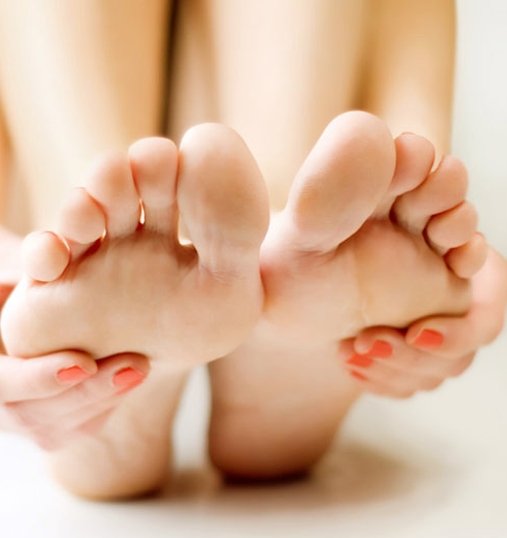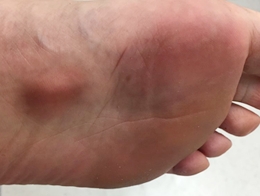Sore Feet

Soreness in your feet can be a very irritating issue, especially if your work demands long standing or if you are planning some physical activity. It is also a very common complaint, as the feet are always subjected to a great amount of pressure. There are many possible reasons why your feet may become sore or even painful, but luckily, there are various measures you can take to prevent and manage this condition. Here are some of the most important facts which can help you to deal with soreness in your feet.
Why are my Feet Sore?
Pain and soreness of the feet are commonly caused by intense physical activity. For example, you can experience sore feet after running due to prolonged pressure applied on the feet bones and tendons. In persons who practice mostly sedentary lifestyle, soreness in the feet can appear even after walking. Some professions demand long standing in one position without much movement. Surgeons for example fall under that category. In these persons, the venous blood and the lymph are not properly evacuated from the lower legs and feet, thus applying even higher pressure to the structures of the feet. Feet pain that stems from standing can sometimes have long-term consequences.
Another cause of feet soreness can be childbearing. During early pregnancy, the overall weight becomes rapidly increased, while the feet are not prepared to sustain that force. Wearing high heels is one of the most common causes of sore feet in women, as it puts a lot of pressure on the calcaneus (the heel bone) and its joints.
There are also some chronic inflammatory conditions which can cause the soreness of the feet. One of them is more common in men than in women and it is called gout. The gout is caused by the accumulation of uric acid in the joints which results in joint inflammation, and it usually affects the thumbs of the feet first. In fact, any condition that causes swelling of the feet, such as thyroid gland problems, can be responsible for the prolonged feet soreness and pain.
Symptoms of Sore Feet
The most common symptoms include tension, irritation, pain, and tingling sensations, but sometimes, the symptoms can be much worse, such as burning and sharp pain in the heel area. These symptoms are in most people transient, which means that they are present during period of physical activity, and they disappear at night during the rest. Furthermore, people who are engaged in sports can also have transient soreness in their feet, which is active only during exercise.
People suffering from diabetes mellitus are in a specific situation. Namely, due to peripheral nerve damage caused by this chronic disease, they have impaired sensations in their lower legs and feet, as well as circulation problems. Injuries of the feet often pass unnoticed until the inflammatory reaction is developed, and they can cause red spots, swelling, blisters, and necrosis of certain areas of the feet. Then they can start experiencing severe soreness and pain in their feet.
How to get rid of Soreness in the Feet?
The cure for soreness in feet highly depends on the cause. For example, people who stand for several hours at work should try to make as many movements as possible in order to support the circulation of blood and lymph. Even making a small effort from time to time to move the toes and heels and feet in different directions will do the work.
If the soreness in your feet stems from running, long walks, or any other type of physical activity, that can mean two things. You are either not prepared well for that level of activity, or you may have some sort of feet abnormality which causes the soreness. In any case, you should downgrade to the less intense level of physical activity until the structures of your feet become strong enough to deal with the increased pressure. In the morning, you could do some simple warm-up exercises to prepare your feet for daily activities. Make it a habit!
Home Remedies
- You can also use some home remedies and techniques to help yourself relieve the pain. For the improvement of poor circulation in the feet, soak your feet every night before bed in cold water, as this stimulates the blood flow.
- Make sure you take enough calcium rich food, as the strength of the bones, tendons, and cartilage structures is highly dependent on the calcium levels. Vitamin D deficiency can jeopardize calcium absorption from the bowels. Therefore, it is important to include in your diet the foods rich in calcium and expose to sunlight more so that your organism can produce enough vitamin D. If you live in an area with a low annual number of sunny days, it is advised to take vitamin D supplements.
- Yoga in combination with foot massage can be very helpful to relieve the soreness in the feet. Take advice from certified professionals on the most helpful yoga techniques for this condition.
- In most cases, if you rest enough and eliminate the uncomfortable footwear, the recovery will be very fast.
When to See a Doctor
If the soreness in your feet makes it hard for you to go to work and to perform daily activities, you should refer all the symptoms to your doctor. Make sure to include all the information about your recent physical activities, diet, and medical history of similar problems. Furthermore, if you have any additional symptoms besides soreness of the feet, you should also make an appointment and see your doctor for further assessment. Pain and other sensations in the feet can be a sign of some more severe disorders related to the nervous system, such as peripheral neuropathy, spine problems, and even Lyme disease.






